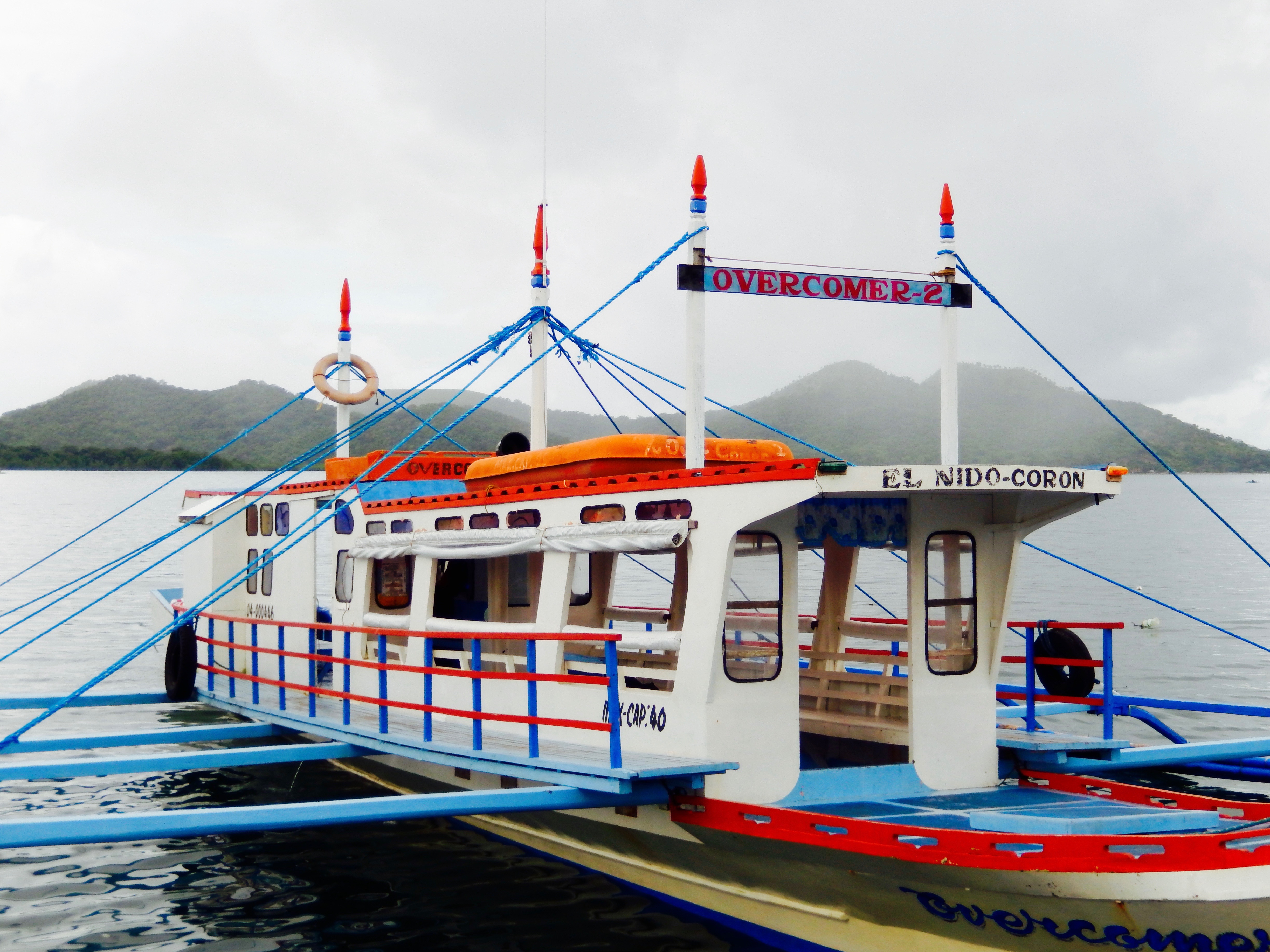In the morning of October of 2013, I boarded a rickety charter boat on the tiny Philippines Island of Coron, traveling to a larger eco-touristy island of Palawan. Once we arrived at the dock, I was drawn to the name of the boat that we were about to board, Overcomer-2. As the crew loaded our bags in the cabin, the Philippines Coast Guard walked around the boat, capturing a little video of everyone that was onboard in a mini handheld video recorder. At the moment, I thought that it was strange and it evoked fear, but to calm my nerves I told myself that it was just standard practice for this remote island. My head knew otherwise, but my sense of adventure carried me on and kept me in the boat. The sun was shining, and my two friends and I climbed out to the front deck to take in the passing views of the Calamian Islands.
About three hours into the trip, as we left the sheltered bay area and entered the open sea, the water took an extreme turn. Just before the big waves hit, the captain came up front and told us to get into the back of the boat. For the remaining six hours of the journey, we hung on for dear life, while mentally planning our escape route to the closest island, if the boat capsized from the massive waves.
Words can’t explain the joy of reaching solid ground again, and it didn’t matter that we all felt sick, that it was raining, or that our bags were soaking wet with saltwater. All that mattered was that we made it to the other side.
After talking to the locals, we quickly learned that there was a good reason why the boat was named Overcomer-2. The first Overcomer sank a while back, and the two at the end of Overcomer represented the resiliency of the captain to start over again.
- What big waves are you facing in your life right now?
- Or have you been fortunate to coast along on calm seas?
- Have you built your resiliency foundation on rocklike facts and sound techniques or on the ease of sand and its quick fixes?
- What do you turn to when adversity hits?
- Do you have a readily available list of things that help you move from crappy to happy? Hopeless to hopeful? Exhausted to energized? Impossible to possible?
- Who do you turn to and how do they support you? Have you thanked them lately for the value that they add to your life?
When we expect to encounter adversity in our lives, it invites us to invest more energy into figuring out how to build our resiliency muscles when the weather is good, the sun is shining, and the waves are small. So, we can better navigate the adversity when the waves are significant, and it feels like life is swirling around us in a big vortex.
Marshall Goldsmith shares in “What Got You Here Won’t Get You There” the twenty habits that hold us back from achieving our fullest potential in ourselves, therefore hindering our ability to add value to others. Three of the twenty habits are focused on our tendency to blame and make excuses. Number thirteen ties into my story above about Overcomer-2 and states the following:
“Habit # 13 Clinging to the past: The need to deflect blame away from ourselves an onto events and people from our pasts; a subset of blaming everyone else.”
Resiliency and grit cannot be developed if we deflect the blame onto the situations, events, or people. Overcomer-2 wouldn’t have been born if the captain blamed the sinking of his ship on the events around him or even the weather. If he did, then it would have held him back from mustering up the resiliency to start again with Overcomer-2.
- What things in your life have you tried to blame away?
- What would happen if instead of blaming, you saw it as a lesson and tried to learn from it?
- Would the act of identifying a lesson to be learned be enough to ignite a change in your perspective towards the negative event?
- What if you mentally switch the perceived locus of control about the situation/event from external to internal, and you turned the trial into a challenge?
- Which one do you tend to associate with more: external or internal?
- Are there any habits that have made you successful in the past but aren’t yielding the same results in the present moment?
In Charles Duhigg’s book, “The Power of Habit: Why We Do What We Do in Life and Business,” he provides this insight about habits:
“When a habit emerges, the brain stops fully participating in decision making. It stops working so hard, or diverts focus to other tasks. So unless you deliberately fight a habit-unless you find new routines-the pattern will unfold automatically. “
What can you do to build your resiliency muscle today and turn it into an energizing habit? Resiliency strength training doesn’t have to be difficult, but it does have to be intentional.
Hal Elrod captures this in a beautiful thought provoking statement in his book called “The Miracle Morning.”
“Research shows that on any given day, the average person thinks somewhere between 50,000-60,000 thoughts. The problem is that 95 percent of our thoughts are the same as the ones we thought the day before, and the day before that, and the day before that.”
If you allow yourself to entertain self-defeating thoughts for the majority of the day, then you are beating yourself down before you can even start to build up resilience.
“Always remember that who you’re becoming is far more important than what you’re doing, and yet it is what you’re doing that is determining who you’re becoming.” -Hal Elrod
Challenge– Open your Bible, read a book, go on a walk with a friend, listen to a podcast, learn from others. Christopher J Wirth’s Podcast called No Quit Living, is a perfect way to gain tips and insights about how real people turn their rock-bottom moments into thriving opportunities. Try to do something new every day for one week and rate how you feel on a scale of 1-10 afterward.
Living a life well lived comes from adversity. Just as we don’t notice how much we appreciate a computer when it is working seamlessly or a car when it’s running smoothly, oftentimes we also don’t always notice how much we appreciate things in life until we are faced with a trial that threatens to take it away. You don’t have to wait until something is gone, broken, or hurt to take action. Instead, be intentional about appreciating it in the state that it is in and always seek to find the lessons to be learned in that particular moment.
We all have an overcomer inside of us.


